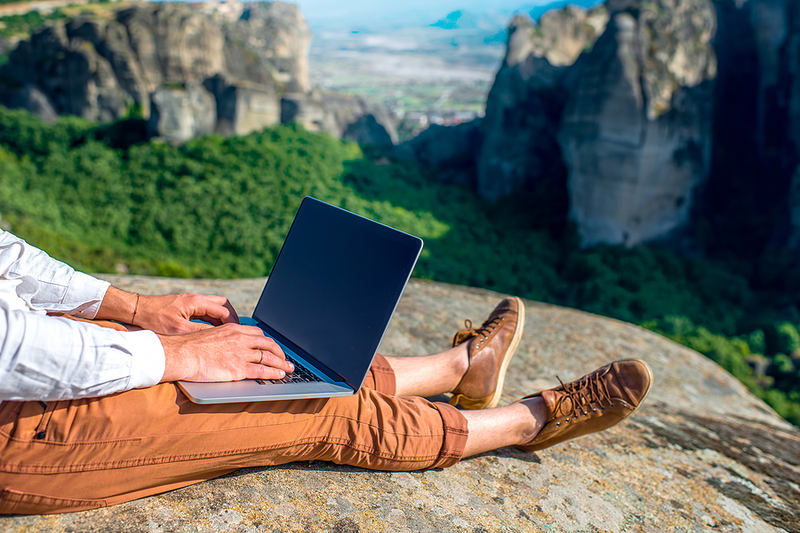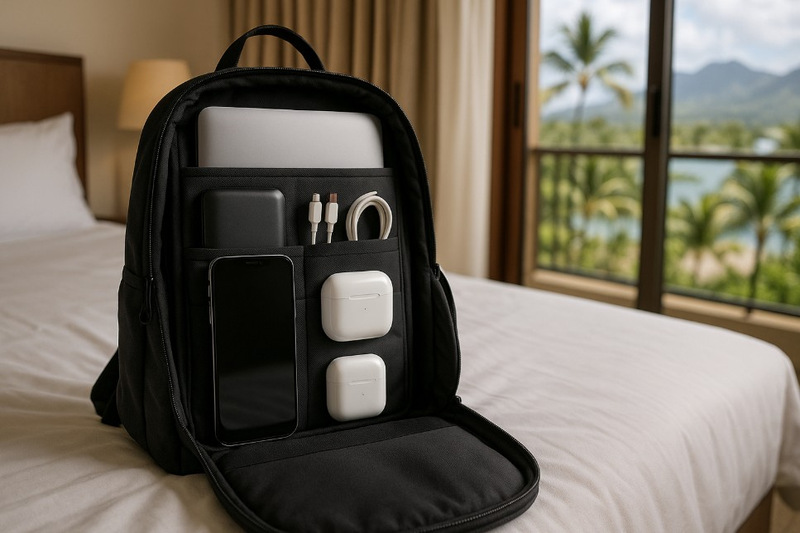
Travelling the world while working online is an incredible lifestyle that can offer unparalleled freedom and the ultimate sense of autonomy. However, managing your tech on the move can quickly become overwhelming, especially when you’re new to this lifestyle. A cluttered digital workspace slows you down, misplaced cables create frustration, and unsecured data exposes you and your clients to serious risks. When your laptop is your livelihood, you need a setup that supports your mobility. And it needs to do so without compromising on security or efficiency.
What Technology Do You Need?
A reliable laptop is essential, but its specifications should match your workload. If your role involves heavy processing tasks, prioritise high-performance processors and ample RAM. However, for work that relies on cloud-based applications, a lightweight ultrabook may serve you better. Just don’t forget to look for one with a long battery life and be sure to back up your files on a regular basis.
A smartphone with international compatibility acts as your backup device. Dual-SIM capability is useful if you often switch between local and international SIM cards, whether that be for keeping in touch with family or for contacting clients spread across the globe. A phone with eSIM support gives you flexibility when choosing data plans and allows you to switch between providers to suit your constantly changing needs, rather than being locked into a restrictive contract.
Noise-cancelling headphones help you stay productive in loud environments. Over-ear models provide better sound isolation, but compact earbuds are easier to carry.
A portable charger prevents you from running out of power at a crucial moment. Look for a model offering fast charging. It should also have enough capacity to recharge your phone and laptop at least once. Whilst thinner, more lightweight models may seem attractive due to their lower weight, heavier and more powerful chargers may be worth the additional weight if you’ll be regularly eating through your devices power.
How to Transport and Store Your Gadgets

If you need to transport your gadgets, don’t forget to take care of them properly. For example, a dedicated laptop sleeve with impact protection can shield your device from knocks or any bag spillages when you’re on the move. Meanwhile, a hard-shell case keeps external drives and accessories safe. Packing cubes designed specifically for electronics can also help you avoid tangled cables and misplaced chargers. Dedicated cable ties for each of your devices can help you quickly and easily identify which components go with each piece of hardware, helping you avoid time spent trying to match ports to connectors.
Store essential accessories in one place so you can access them quickly. A compact tech organiser holds your adapters, SD cards, and charging cables in separate compartments. Be sure to keep all your accessories clean and clear of any debris to limit the risk of connectivity problems or them breaking from damage.
For added security, avoid carrying all your devices in a single backpack. Keep a backup hard drive or secondary device in a different location. This way, you don’t lose access to your work if you misplace your main bag or it gets stolen. Additionally, it’s often worth turning on services such as Apple’s Find My or Google’s Find My Device so you can try to locate, remotely lock or even wipe your device if you happen to misplace them or accidentally leave them in a specific location you’ve been working from.
Protecting Your Data and Devices
Unsecured Wi-Fi exposes your data to cyber threats. Download VPN software to encrypt your connection whenever you use public networks. Just don’t forget to choose a service with strong encryption and a no-logs policy to keep your browsing private.
You’ll also need to think about the safety of your accounts because just a strong password isn’t enough. Enable multi-factor authentication on email, banking, and work-related services to block unauthorised logins. Use a password manager to generate and store unique passwords securely. Avoid making note of passwords in any physical format, whether this be in a notebook or in your phone, as this can leave you vulnerable should someone happen to get hold of your belongings.
Travelling as a digital nomad should feel liberating, not chaotic. Your tech should serve you – not the other way around.
